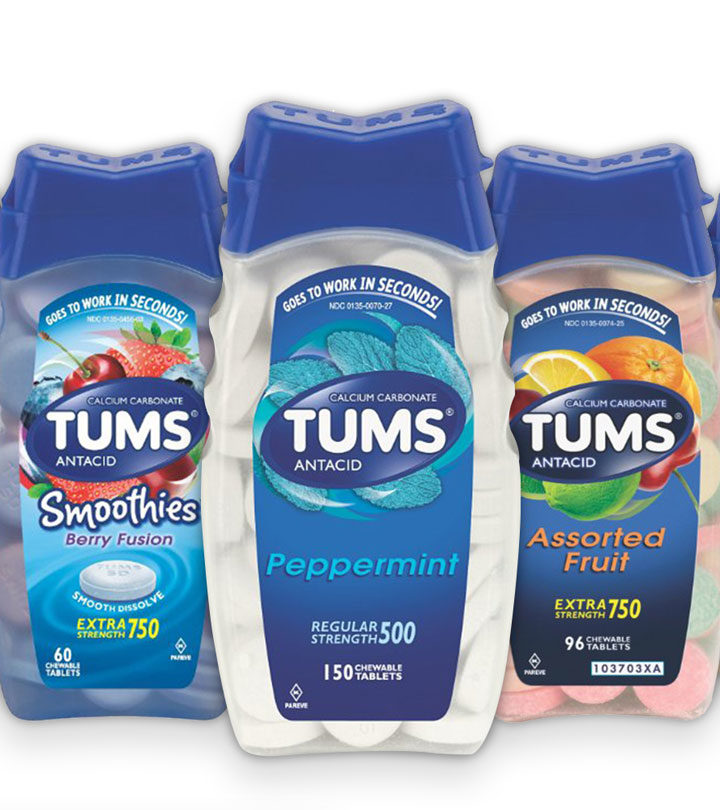Are Tums Extra Strength Safe to Take While Pregnant

- What is Tums?
- Is it safe to take Tums when pregnant?
- Ideal dosage of Tums during pregnancy
- Benefits of Tums during pregnancy
- Side effects of Tums during pregnancy
- Frequently asked questions
Nearly 80% of pregnant women have heartburn in their third trimester. Though harmless, heartburn can be uncomfortable and needs proper medical attention (1).
You may want to use Tums, the generic antacid, for treating heartburn.
Here, MomJunction tells you if Tums is safe during pregnancy, how it can help you as well as have some side effects.
What Is Tums?
Tums is an antacid comprising sucrose (sugar) and calcium carbonate. It is the brand name for a specific variety of antacid that is manufactured by GlaxoSmithKline. The drug is available over-the-counter (OTC) at most retail stores in the US.
Tums is known to provide quick and effective relief from heartburn, indigestion, gas, acid reflux, bloating and stomach upset. The medication is available in the form of chewable tablets, which come in a variety of flavors (2).
Back to top
Is It Safe To Take Tums When Pregnant?
Yes, Tums is safe for pregnant women, but only when its potential benefits outweigh the possible risks. The US FDA has classified the medicine under category C drugs, which means animal studies have shown adverse effects on the fetus but the drug has not been tested on humans (3).
[ Read: Remedies To Treat Heartburn In Pregnancy ]
Back to top
Side Effects Of Tums During Pregnancy
Unlike a few other medications, Tums is likely to cause specific potential side effects during pregnancy. They are:
- Dry mouth
- Stomach pain
- Nausea and vomiting
- Belching
- Frequent urge to urinate
You need to be cautious, and keep a few things in mind when taking Tums during pregnancy.
- Avoid taking Tums if you have a history of kidney disorder or parathyroid gland disorder. Tums, which is high in calcium content, might lead to kidney stone formation and imbalance the calcium levels in the body (4).
- Ask your doctor about the right dosage to take to prevent side effects. Do not exceed the required dosage.
- Taking Tums for heartburn can increase your calcium intake, but the medication should not be used as a calcium supplement during pregnancy.
Back to top
Ideal Dosage Of Tums During Pregnancy
You may take two to four tablets of Tums every two hours to get the needed relief from heartburn (5). However, it is advisable to consult your doctor before taking any antacid. Also, always maintain a gap of at least two hours between taking an antacid and iron supplements to derive maximum benefits from both the medicines (6).
Back to top
How Does Tums Help You During Pregnancy?
The doctor might allow you to take the medicine for quick relief from heartburn caused by acidity. Usually, antacids that contain calcium and magnesium are used as the first line treatment for treating heartburn during pregnancy (7). Since Tums is a good source of calcium, taking them for heartburn will also increase your calcium intake and help you get the ideal amount of the nutrient during pregnancy.
The right amount of calcium in your diet prevents lead absorption in bones and may also lower the risk of hypertensive disorders and preeclampsia (8) (9).
Over usage of the medicine, however, could have adverse effects on you. Next, we address some commonly asked questions about Tums during pregnancy.
[ Read: Measures To Prevent Indigestion In Pregnancy ]
Back to top
Frequently Asked Questions
1. Can I take Eno Tums while pregnant?
Yes, you can use Eno Tums, which is just another brand of the antacid that has similar effects.
2. Besides Tums, what else can I take for heartburn during pregnancy?
You may consider taking other antacids such as Rolaids, Maalox, Pepcid and Mylanta (10). However, check with your healthcare provider before using any of these medications. Besides medication, eating smaller meals, avoiding acidic and spicy foods, drinking lots of water, unsweetened coconut water, and mint tea can also provide relief from heartburn.
3. Can I take Tums and Zofran together?
Yes, Tums and Zofran can be taken together, since there are no studies to show that their interaction is negative. While Tums is for heartburn, Zofran treats nausea and morning sickness.
4. Can I take Tums for nausea while pregnant?
Yes, Tums might help in relieving nausea, which is likely to occur alongside heartburn or an upset stomach.
5. Can too many Tums hurt the baby during pregnancy?
Yes, excessive intake of Tums can increase calcium levels in the body (hypercalcemia), which is known to cause maternal, fetal and neonatal complications. (11)
Heartburn during pregnancy is extremely uncomfortable, but you can surely avoid it by making some smart changes to your diet and lifestyle. Stay away from foods and beverages that trigger gastrointestinal distress, eat small meals at frequent intervals, drink enough water every day and avoid eating close to bedtime.
Back to top
[ Read: Consuming Antacid During Pregnancy ]
Have you used Tums while pregnant, and how did it help you? Share your experiences in the comments section below.
References:
MomJunction's articles are written after analyzing the research works of expert authors and institutions. Our references consist of resources established by authorities in their respective fields. You can learn more about the authenticity of the information we present in our editorial policy.
Recommended Articles:
- Types Of Medication To Avoid In Pregnancy
- Effects Of Drugs During Pregnancy
- Is It Safe To Use Doxinate During Pregnancy?
- When To Take Aspirin In Pregnancy
The following two tabs change content below.
- Reviewer
- Author

Dr Anita Gupta is currently working in University College of Medical Sciences (Medical School) & Guru Teg Bahadur Hospital, Delhi. She has been practicing as a gynecologist & obstetrician for the past 31 years and as a lactation consultant for 18 years. Dr. Gupta is a fellow of Indian College of Obstetricians and Gynaecologists, and a master trainer and course... more

Rebecca is a pregnancy writer and editor with a passion for delivering research-based and engaging content in areas of fertility, pregnancy, birth, and post-pregnancy. She has been into health and wellness writing since 2010. She received her graduate degree in Biotechnology and Genetics from Loyola Academy, Osmania University and obtained a certification in 'Nutrition and Lifestyle in Pregnancy' from Ludwig... more
Are Tums Extra Strength Safe to Take While Pregnant
Source: https://www.momjunction.com/articles/tums-while-pregnant_00375072/
0 Response to "Are Tums Extra Strength Safe to Take While Pregnant"
Post a Comment